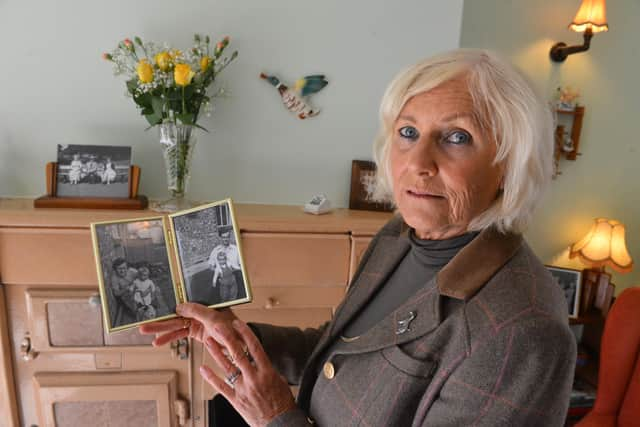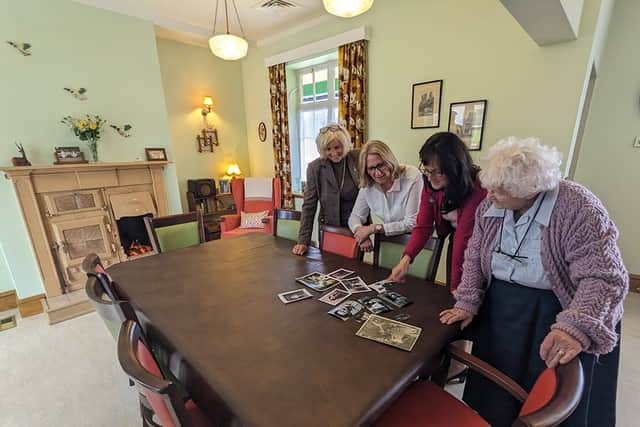Watch as new Beamish Museum 1950s cottages open to help people living with dementia and Alzheimer's
and live on Freeview channel 276
People on Wearside living with Alzheimer's and dementia are set to benefit following the unveiling of the new Aged Miners’ Cottages at Beamish Museum - the latest addition to their 1950s town.
Beamish proudly promotes itself as the ‘Living Museum of the North’ and this founding principle of transporting older visitors back to their childhood and youth is set to be taken a step further with the new cottages set to host visitors suffering from dementia and Alzheimer’s.
Advertisement
Hide AdAdvertisement
Hide AdWhile people with such conditions struggle with their short term memory they may often have a much more vivid recollection of their childhood and young adulthood.
Each week, residents from local care homes are set to visit Clover Cottage where the familiarity of their surroundings will help to ensure they feel comfortable and spark recollections and discussions.


The sessions have already been taking place at the museum’s Orchard Cottage but will now take place in the more familiar 1950s setting of the cottages.
Beamish Museum’s head of health and wellbeing, Michelle Kindleysides, said: “We work with people living with dementia.
Advertisement
Hide AdAdvertisement
Hide Ad“The whole house has been developed to look like it’s in the 1950s but it has been designed to be accessible and dementia friendly to allow everyone to enjoy being in the cottage and to feel safe."
Types of activities which take place in the sessions includes listening to music from the 40s and 50s on the record player, playing music and singing along on the piano and looking at past photographs and magazines, all while enjoying a cup of tea.
However Michelle added: “We don’t just reminisce with people in the cottage as here at Beamish it’s all around us.
“What we find is that people see things which look and feel familiar and we don’t need to say ‘did you have this?’ or ‘do you remember that?’, people just recognise and say things instinctively.
Advertisement
Hide AdAdvertisement
Hide Ad“We’ve also now got more space in the cottage with a living room, dining room and a kitchen as well as the outdoor space and so we will be doing craft work, woodwork, baking, gardening, all kinds of different things.”


To help ensure the period authenticity, some of the visitors with dementia or Alzheimer’s were consulted about the colour schemes and furnishings to use on the inside of the cottages.
One of those was Jean Altoft, who sadly passed away at 93 before the cottages were opened, but her daughter Christine Tindle was at Beamish for the official unveiling.
Christine, 68, said: “My mam was suffering from Alxheimer’s but she was part of a team of people consulted about the colours to use in the house and the type of furniture to include.
Advertisement
Hide AdAdvertisement
Hide Ad“Clover cottage also includes photographs of me as a child with my parents.
“It’s amazing to see the cottages here today but it's just sad that my mother didn’t get to see them finished.”
Christine, who lives in Rowley near Consett, was fulsome in her praise of the role the museum can play in supporting people living with Alzheimer’s and dementia.
She added: “Beamish was the only place we could take my mam where she felt happy and secure.
Advertisement
Hide AdAdvertisement
Hide Ad“She loved to recollect her memories from the past and the museum is a place where she felt herself and could forget she had Alzheimer’s.
“I see your memory as being like a filing cabinet and if it gets knocked over those files at the top fall out, but those in the bottom draw remain.
“The new cottages are fantastic, but the support provided to people is down to the staff, not the artefacts.”
Clover Cottage will also be used as a meeting place to help tackle social isolation and to support people with a range of mental health issues - not just dementia - with activities in place to help their wellbeing.
Advertisement
Hide AdAdvertisement
Hide AdMichelle said: “We work really closely with local adult mental health teams, occupational therapists and social prescribers who will refer people who may benefit from our programme to our team.”
The cottages will open to the public from Friday October 6.
Comment Guidelines
National World encourages reader discussion on our stories. User feedback, insights and back-and-forth exchanges add a rich layer of context to reporting. Please review our Community Guidelines before commenting.